#carbon emissions
Text

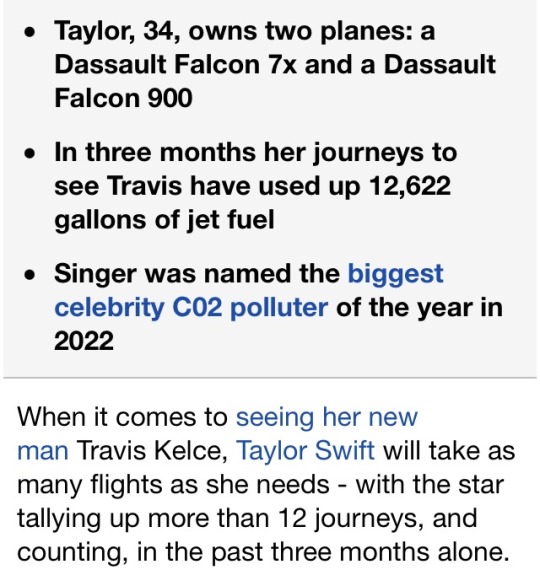



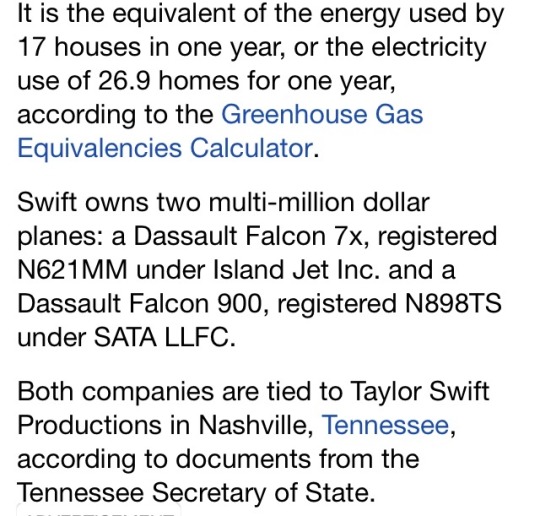

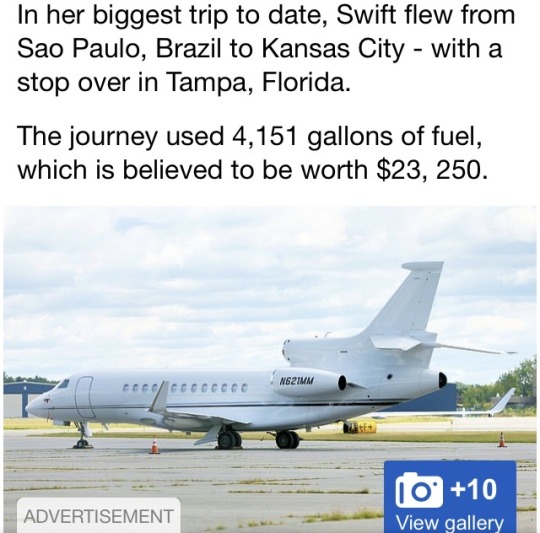

imagine being that fucking rich and that fucking careless.
#anti taylor swift#taylor swift is a climate criminal#taypollution#carbon emissions#co2#the goth punk billionaire#climate change#climate crisis
36K notes
·
View notes
Text
















Sorry for the bad photo quality, Tumblr doesn't like posts this long.
#ramblings#politics#communism#socialism#climate change#not a reblog#when our turn comes#we shall not make excuses for the terror#environment#enviromentalism#carbon emissions#carbon footprint#global warming#climate collapse#anti capitalism#radical left#left wing#long posts#long post#color of the sky#hot take#this took like 20 minutes to upload because Tumblr kept crashing#and like 90 minutes to make
43K notes
·
View notes
Text
"In an unprecedented step to preserve and maintain the most carbon-rich elements of U.S. forests in an era of climate change, President Joe Biden’s administration last week proposed to end commercially driven logging of old-growth trees in National Forests.
Secretary of Agriculture Tom Vilsack, who oversees the U.S. Forest Service, issued a Notice of Intent to amend the land management plans of all 128 National Forests to prioritize old-growth conservation and recognize the oldest trees’ unique role in carbon storage.
It would be the first nationwide amendment to forest plans in the 118-year history of the Forest Service, where local rangers typically have the final word on how to balance forests’ role in watershed, wildlife and recreation with the agency’s mandate to maintain a “sustained yield” of timber.
“Old-growth forests are a vital part of our ecosystems and a special cultural resource,” Vilsack said in a statement accompanying the notice. “This clear direction will help our old-growth forests thrive across our shared landscape.”
But initial responses from both environmentalists and the logging industry suggest that the plan does not resolve the conflict between the Forest Service’s traditional role of administering the “products and services” of public lands—especially timber—and the challenges the agency now faces due to climate change. National Forests hold most of the nation’s mature and old-growth trees, and therefore, its greatest stores of forest carbon, but that resource is under growing pressure from wildfire, insects, disease and other impacts of warming.
Views could not be more polarized on how the National Forests should be managed in light of the growing risks.
National and local environmental advocates have been urging the Biden administration to adopt a new policy emphasizing preservation in National Forests, treating them as a strategic reserve of carbon. Although they praised the old-growth proposal as an “historic” step, they want to see protection extended to “mature” forests, those dominated by trees roughly 80 to 150 years old, which are a far larger portion of the National Forests. As old-growth trees are lost, which can happen rapidly due to megafires and other assaults, they argue that the Forest Service should be ensuring there are fully developed trees on the landscape to take their place...
The Biden administration’s new proposal seeks to take a middle ground, establishing protection for the oldest trees under its stewardship while allowing exceptions to reduce fuel hazards, protect public health and safety and other purposes. And the Forest Service is seeking public comment through Feb. 2 (Note: That's the official page for the proposed rule, but for some reason you can only submit comments through the forest service website - so do that here!) on the proposal as well as other steps needed to manage its lands to retain mature and old-growth forests over time, particularly in light of climate change.
If the Forest Service were to put in place nationwide protections for both mature and old-growth forests, it would close off most of the National Forests to logging. In an inventory concluded earlier this year in response to a Biden executive order, the Forest Service found that 24.7 million acres, or 17 percent, of its 144.3 million acres of forest are old-growth, while 68.1 million acres, or 47 percent, are mature."
-via Inside Climate News, December 20, 2023
-
Note: This proposed rule is current up for public comment! If you're in the US, you can go here to file an official comment telling the Biden administration how much you support this proposal - and that you think it should be extended to mature forests!
Official public comments really DO matter. You can leave a comment on this proposal here until February 2nd.
#united states#us politics#conservation#climate change#sustainability#forests#old growth forest#national forest#carbon emissions#climate action#climate crisis#forest service#biden#biden administration#public comment#good news#hope#it took me soooo long to hunt down the actual public comment link#by which I mean like 10 minutes but like#that's too long! especially considering I am way better at navigating language and bureaucratic websites like this#than A LOT of people#why tf can't you just comment on the Official Website For Public Commenting?#aka regulations.gov#baffling#anyway the good news is I did find it so pls do go ahead and submit a comment if you can
3K notes
·
View notes
Text
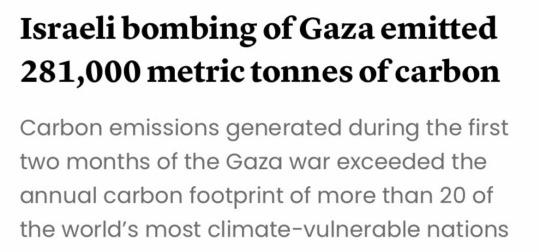
Happy Earth Day!🌎
#free palestine#palestine#gaza#from the river to the sea palestine will be free#free gaza#pray for palestine#ceasefire#permanent ceasefire#earth day#carbon emissions#eco friendly#israel#genocide#america#usa
1K notes
·
View notes
Text

Dark Fountains Causing the Apocalypse? ❌😒
Dark Fountains as a Metaphor for Global Warming? ✅👏
#deltarune is a metaphor for climate change#change my mind#also climate change is real and Ralsei is an environmentalist#bread#comic#deltarune comic#used a new brush today for line art! absolutely loved it#I love changing up my style and consistency!#deltarune#art#my art#memes#carbon emissions#reduce carbon emissions#environmental action#this only took me like an hour and a half? not bad!!#yes I’m pushing my own ideals on delatrune. who hasn’t#ralsei deltarune#ralsei#kris dreemurr#susie deltarune
3K notes
·
View notes
Text
The richest 1% of humanity is responsible for more carbon emissions than the poorest 66%, with dire consequences for vulnerable communities and global efforts to tackle the climate emergency, a report says.
The most comprehensive study of global climate inequality ever undertaken shows that this elite group, made up of 77 million people including billionaires, millionaires and those paid more than US$140,000 (£112,500) a year, accounted for 16% of all CO2 emissions in 2019 – enough to cause more than a million excess deaths due to heat, according to the report.
Twelve billionaires’ climate emissions outpollute 2.1m homes, analysis finds
#climate crisis#oxfam#carbon emissions#can't believe I'm here stressing over washing my fucking table towels vs. using paper towels#and some fuckers are out there mining bitcoin 24/7
2K notes
·
View notes
Text

720 notes
·
View notes
Text
The CO2 emissions of 345 big polluters in the Netherlands dropped by over 13 percent to 58.9 million tons last year. That is a record annual decrease, the Dutch Emissions Authority (NEa) reported. The energy sector saw the biggest drop, while the aviation sector’s emissions increased by 11 percent, NOS reports.
The energy sector - responsible for the largest share of CO2 emissions - saw its emissions fall by 5.7 million tons compared to 2022. The sector accounted for over two-thirds of the total decrease last year.
The big drop is due to energy companies generating more electricity from renewable sources and less from fossil fuels. That is striking, given that the government lifted restrictions on coal-fired power stations last year due to concerns about the security of the electricity supply. According to the NEa, the four Dutch coal power plants emitted 4.6 million tons less CO2 than in 2022.
CO2 emissions in the aviation sector increased by 11 percent last year. It concerns flights within the European Economic Area by airlines that fall under Dutch supervision. The fact that planes are becoming cleaner cannot outweigh the increased number of flights, the NEa said. The aviation sector’s CO2 emissions are approaching the sector’s pre-pandemic peak again.
continue reading
Make international train travel cheaper, and make flying more expensive, FFS!
225 notes
·
View notes
Text
#good news#environmentalism#science#environment#green cement#cement#architecture#construction#carbon emissions#co2 reduction#carbon footprint
99 notes
·
View notes
Text
I've been reading 'The Climate Book' from Greta Thunberg, and I have to talk about it. I've never seen a book written so brilliantly and desperately, pleading for awareness, for action, for survival. I thought I was aware of the climate change, but there was a vast amount of information I did not know. I'll start from the ones I did.
I knew that the climate has already changed, and will continue to change until a lot of animal species will go extinct, and a big amount of human beings will suffer, end up impoverish, misplaced, in starvation, or dead. I knew the culprits were the companies that refused to stop taking down forests, burning fossil fuels, promoting lifestyles of consumerism, over-consumption, generated the amount of waste that the planet could not safely consume or store. I also knew that one of the biggest pollutants were big oil, animal and plant agriculture, fast fashion industry, travel industry, and the capitalistic system that enabled 1% of humanity to own and over-consume 90% of the resources available to us. Knowing this made me feel powerless, because even as I boycott all of it, I can't do much else, and I'm not enough to stop what is going on. I am merely a drop in the ocean - which is what Greta points out as well. But, Greta doesn't think we're powerless.
This book is incredible in the sense that it goes over and beyond to think practically. It doesn't despair, it doesn't panic, it doesn't think any other way but how to practically and effectively bring change, what are the options and possibilities, what is true and what is propaganda, how to avoid millions of deaths and extinctions that are sure to come, if we do nothing. Greta has analyzed all action that is 'being done', and found out most of it was fraud, cheating, lying. All of the governments and companies who were bragging about reduced emissions, or offsetting emissions, have simply found ways to outsource them and to emit them in another, poorer country. The amount of emissions has actually increased.
She has also interviewed the world leaders, and people responsible and suffering from climate change - and these are the results: Nobody feels responsible, nobody feels as if it's their turn to change, to reduce, to do anything to help it. Even interviewing people whose livelihood was taken away from them due to climate change, who have lost their living environments already, their trees and animals and fields and fertility and soil, when asked if they would be willing to work ecologically from now on, with reduced or low emissions, their answer was 'Why should we? It's not fair, they took from us and enjoyed, while we suffered. We won't stop until we have what they have. We deserve it.'
With this information, Greta has found a truth of how humans influence each other - we imitate. If we see someone else doing something, or having something we find desirable, we also want it. We look at ourselves in relation to other people that surround us, we take responsibility according to what others around do, and we hold ourselves accountable only as much as others do. And this is why we have a power that goes beyond individual action, beyond simply lowering our own emissions and boycotting companies that are responsible for pollution - we are able to influence others. We're able to influence the media, which forms public opinions, and using the media, force into action those who benefit from polluting the planet.
What I didn't know, and this book taught me, was that from the times humans started to hunt, they didn't only have a great effect on the environment, they were the absolute leading agent on it. Soon after hunting the megafauna into extinction, the environment started to change not just because we affected it, but because we directed it to. We caused the extinction of many species throughout the past, by hunting, taking wild spaces for our own use, polluting water sources, changing the climate, spreading predatory species, like cats and rats, and we didn't stop there. We changed the landscapes of forests and fields, into human-used agricultural land that was effectively deadened for the purpose of wildlife. We domesticated, and then farmed animals, to such extreme degree, that right now what is left of the wildlife, is mere 12-15% of all animals out there. More than 80% of current animals by weight living on earth, are put there by animal agriculture, meant for human consumption. That is absolutely insane. We did the same with the wildlife environment as well – there is now only 3% of the forests on earth, that are still considered intact. We changed the landscape, not only slightly, but by erasing most of it, making it unusable to animals, insects or wild plants, appropriated only for agriculture, grazing, and human-only environments. And, we dug up and released so much carbon into the air, it is coming close to the amount that we had on the earth, at the time of dinosaur extinction, which wiped out a third of the planet's species. And we keep doing it, even knowing what will happen, knowing that every single time this happened in the past, it created mass extinction.
I wasn't aware how serious and extreme the changes we made were. Knowing what is going out, makes it very clear why we have a crisis, it would be crazy to expect not to have one. These changes were not reported, nobody was asked to approve of them, there were no regulations or limits, no environmental studies on consequences, and it keeps going. We keep increasing the demand for agriculture and animal products, increasing our consumption even though we are running out of the natural resources used to create the products. And it is not our fault. Most of the food and meat created by destroying this land, will go to waste, for the profit of the corporations. The world will keep living in starvation, despite so much of natural life getting destroyed for food, despite the climate crisis being caused, partly by our food production.
This doesn't mean we can't sustainably feed ourselves anymore, it just means we can't do it the way we're used to. It just tells us we need to use more resilient and less land and water consuming food. Plant based diets demand less soil and emit less carbon, gardening reduces the amount of agricultural space needed to feed us, supporting and protecting wildlife wherever it's still thriving, will save both soil, animal species, and biodiversity that is very quickly fading from the planet.
I've also learned that even as we're close to the tipping point, but haven't reached it yet. Whatever we do right now that stops us from reaching it, will mean the difference between life and death to the future generations of people, animals, and plants. If we manage to make changes now, to stop the ice from melting past the tipping point, we can save millions of lives, that would end in certain death otherwise. If we can create policies that are not volountary but binding, we have a chance to save livable land, animal and plant species, biodiversity, and human quality of life. It's not too late to act, in fact, this is the vital time to act, and we're the only ones who can do it.
And the way you can act is not just by reducing waste, reducing the amount of energy you consume, reducing animal-products in your food and refusing to waste and throw away usable goods, but by being public about it. By making it clear it's a positive improvement on your life, on your quality of life, that it's both moral and enjoyable, both inspiring and encouraging others to do the same. Some of us have bigger impact on others than we might know, and if we start doing it and visibly enjoying it, there are others who will follow.
This book has taught me immense amount of science behind the climate crisis, and gave me incentive to do more than just live and feel helpless, I need to do more. I recommend this book to anyone wanting to learn more, and wanting to act more. I will be from now on, writing more about ecology and preserving the planet, and how to do it. If we're the directors of where this planet is going, we have to be so intentionally, with knowledge, wisdom and awareness of what we are doing. We can do good, and humans have been doing good, any time there's been wisdom, awareness and intention in how we're shaping the environment. And if anyone wants the book in the audio form, send me a message and I will give it to you.
#Greta Thunberg#The Climate Book#book review#climate crisis#climate change#global warming#actions to stop global warming#impacting others to understand and prevent the worst of the worst#carbon emissions#lying politicians
598 notes
·
View notes
Text
Researchers report that replacing 50% of animal products with alternative proteins by 2050 could free up enough agricultural land to generate renewable energy equivalent in volume to today's coal-generated power while simultaneously removing substantial CO2 from the atmosphere.
The study, published in the journal One Earth, is based on a CO2-removal method known as "bioenergy with carbon capture and storage" (BECCS), which involves cultivating quickly growing crops whose biomass can then be stored permanently in geological formations or used as a feedstock to produce renewable energy.
Continue Reading.
#Science#Enviroment#Earth Science#Animal Husbandry#Carbon Emissions#Carbon Capture#Climate Change#Diet
106 notes
·
View notes
Text
283 notes
·
View notes
Note
have you seen this?? https://reasonstobecheerful.world/hempcrete-construction-us-building-code-sustainable/
Thank you for sharing this!
Although hempcrete is used in many other countries, it was banned in the US building code for a long time due to the association between hemp and marijuana.
Now that ban has been lifted, which paves the way for this more sustainable building material to be used widely in the states.
"It requires three times less heat to create than concrete, weighs about one-eighth as much as concrete (leading to fewer transport-related emissions), and actively sequesters CO2 — according to one Cambridge University researcher, hemp absorbs between eight to 15 metric tons of carbon per hectare, significantly more than the two to six metric tons typically captured by forests."
#good news#environment#sustainable building#green building#sustainability#climate change#carbon dioxide#hope#sustainable concrete#green concrete#submission#ask#anonymous#tw marijuana#hemp#carbon emissions#environmental despair#ecoanxiety#global warming
901 notes
·
View notes
Text
"The sleeping giant of the US Environmental Protection Agency (EPA) has stirred.
In the past month, an avalanche of anti-pollution rules, targeting everything from toxic drinking water to planet-heating gases in the atmosphere, have been issued by the agency. Belatedly, the sizable weight of the US federal government is being thrown at longstanding environmental crises, including the climate emergency.
On Thursday [May 18, 2023], the EPA’s month of frenzied activity was crowned by the toughest ever limits upon carbon pollution from America’s power sector, with large, existing coal and gas plants told they must slash their emissions by 90% or face being shut down.
The measure will, the EPA says, wipe out more than 600m tons of carbon emissions over the next two decades, about double what the entire UK emits each year. But even this wasn’t the biggest pollution reduction announced in recent weeks.
In April, new emissions standards for cars and trucks will eliminate an expected 9bn tons of CO2 by the mid-point of the century, while separate rules issued late last year aim to slash hydrofluorocarbons, planet-heating gases used widely in refrigeration and air conditioning, by 4.6bn tons in the same timeframe. Methane, another highly potent greenhouse gas, will be curtailed by 810m tons over the next decade in another EPA edict.
In just a few short months the EPA, diminished and demoralized under Donald Trump, has flexed its regulatory muscles to the extent that 15bn tons of greenhouse gases – equivalent to about three times the US’s carbon pollution, or nearly half of the entire world’s annual fossil fuel emissions – are set to be prevented, transforming the power basis of Americans’ cars and homes in the process...
If last year’s Inflation Reduction Act (IRA), with its $370bn in clean energy subsidies and enticements for electric car buyers, was the carrot to reducing emissions, the EPA now appears to be bringing a hefty stick.
The IRA should help reduce US emissions by about 40% this decade but the cut needs to be deeper, up to half of 2005 levels, to give the world a chance of avoiding catastrophic heatwaves, wildfires, drought and other climate calamities. The new rules suddenly put America, after years of delay and political rancor, tantalizingly within reach of this...

“It’s clear we’ve reached a pivotal point in human history and it’s on all of us to act right now to protect our future,” said Michael Regan, the administrator of the EPA, in a speech last week at the University of Maryland. The venue was chosen in a nod to the young, climate-concerned voters Joe Biden hopes to court in next year’s presidential election, and who have been dismayed by Biden’s acquiescence to large-scale oil and gas drilling.
“Folks, this is our future we are talking about, and we have a once-in-a-generation opportunity for real climate action,” [Michael Regan, the administrator of the EPA], added. “Failure is not an option, indifference is not an option, inaction is not an option.” ...
It’s not just climate the EPA has acted upon in recent months. There are new standards for chemical plants, such as those that blight the so-called "Cancer Alley" the US, from emitting cancer-causing toxins such as benzene, ethylene oxide and vinyl chloride. New rules curbing mercury, arsenic and lead from industrial facilities have been released, as have tighter limits on emissions of soot and the first ever regulations targeting the presence of per- and polyfluoroalkylsubstances (or PFAS) in drinking water.” ...
For those inside the agency, the breakneck pace has been enervating. “It’s definitely a race against time,” said one senior EPA official, who asked not to be named. “The clock is ticking. It is a sprint through a marathon and it is exhausting.” ...
“We know the work to confront the climate crisis doesn’t stop at strong carbon pollution standards,” said Ben Jealous, the executive director of the Sierra Club.
“The continued use or expansion of fossil power plants is incompatible with a livable future. Simply put, we must not merely limit the use of fossil fuel electricity – we must end it entirely.”"
-via The Guardian (US), 5/16/23
#epa#environmental protection agency#united states#us politics#coal#cw cancer mention#pfas#sustainability#carbon emissions#good news#hope
6K notes
·
View notes
Text
Do you think the way we could get Swifties to start noticing the negatives about Taylor Swift is by adding the line “Taylor could/should do better”
She’s hanging out with Brittney maholms, sexual assault apologist, and calling her a best friend? Taylor’s better than that.
She’s the #1 individual carbon emitter in the world? She should be doing better.
She’s proud she dated a racist and has actively praised him? Taylor shouldn’t drop herself to that level of pathetic men.
#we might be able to get the ration one or the surface level new fans#anti taylor swift#anti swifties#anti anti#carbon emissions#racisim
65 notes
·
View notes
Text

Does the HumVEE qualify for the tax credit?

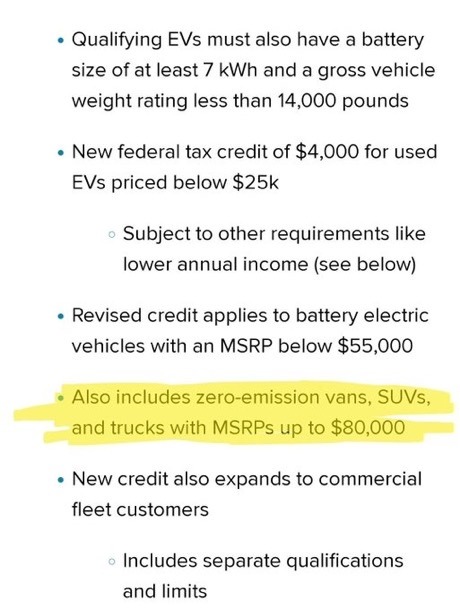
Nope it absolutely does not.
“Great American road trip is going to be electric”
It’s gunna be a long trip, and it costs about 70-90 bucks worth of electricity to fully charge its battery.

Can an average income individual afford the cost of an electric vehicle?
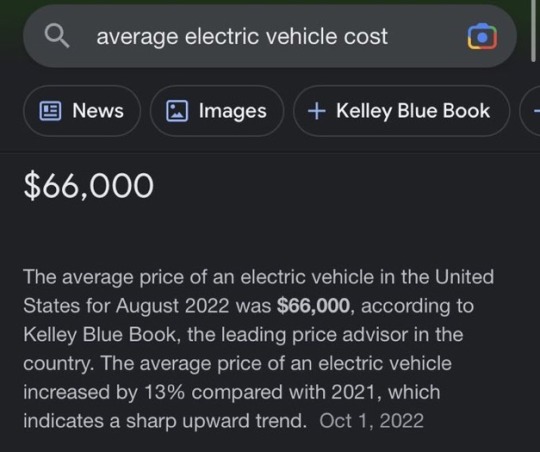

God. No.
#cars#electric cars#zero emissions#climate solutions#climate change#carbon emissions#automotive#joe biden#eco friendly
462 notes
·
View notes